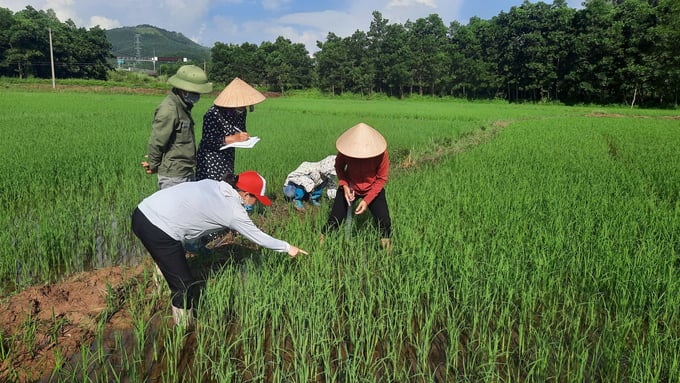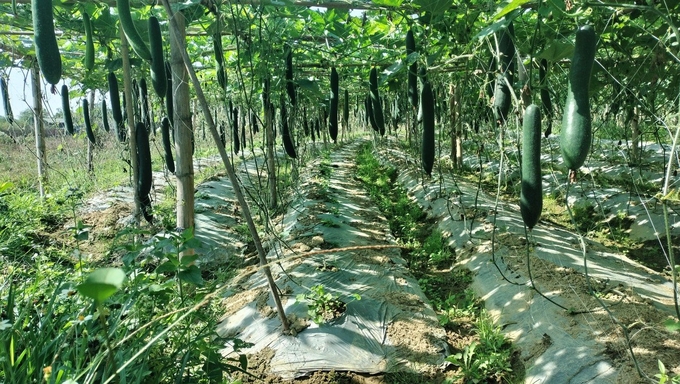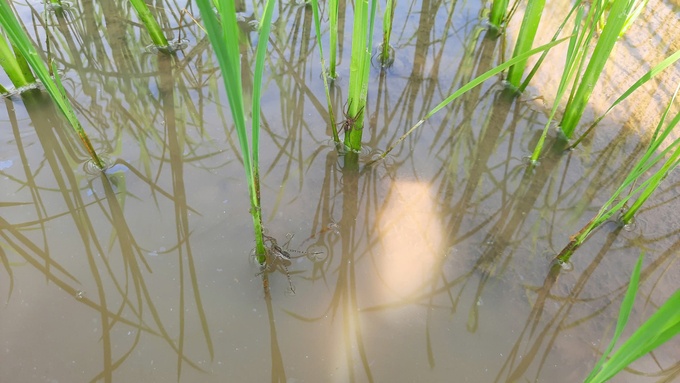November 25, 2025 | 02:56 GMT +7
November 25, 2025 | 02:56 GMT +7
Hotline: 0913.378.918
November 25, 2025 | 02:56 GMT +7
Hotline: 0913.378.918
In numerous localities in Quang Ninh, intensive cultivation, overuse of chemical fertilizers, and pesticides used to be popular several years ago. The pollution of soil and water environments, which led to soil degradation, was primarily caused by the excessive use of chemical fertilizers and the unreasonable application of pesticides.

IPM training instructors guide farmers to visit fields and check for rice pests. Photo: Nguyen Thanh.
The long-term effects on human health and the ecosystem have been the result of the misuse of pesticides, which is intended to quickly eliminate crop pests and improve product appearance without consideration for the safety of natural enemies, the safe interval before harvesting, or the accumulation of pesticide residues in products and the environment (soil, water, air). Additionally, it has disrupted the ecological equilibrium of the fields, thereby facilitating the proliferation of parasites.
The Integrated Pest Management (IPM) program for crops has been actively embraced by the people of the province in recent years. This method has been instrumental in the following areas: reducing production costs, reducing the amount of harmful pesticides in the environment and products, ensuring the health of producers, ensuring food safety, stabilizing and balancing the field ecosystem, increasing productivity, improving quality, and increasing profits per unit of cultivation.
The IPM program has been implemented in Quang Ninh province since 2016, according to Mr. Tran Van Thuc, Head of the Plant Protection and Cultivation Sub-Department. The program's objective is to enhance the application of IPM and provide producers with training, particularly through field training.

IPM model of growing squash in Hoa Binh commune, Ha Long city. Photo: Nguyen Thanh.
Consequently, farmers in the province have actively implemented the IPM model for a variety of commodities, modifying their practices of using pesticides whenever pests appear, cultivating and nurturing healthy plants, and conducting regular field inspections. Farmers have developed into field experts, which enables them to proactively and effectively manage pests, defend natural enemies, and produce safe agricultural products while also safeguarding the local ecological environment.
Mr. Hoang Van Hai (Hoa Binh commune, Ha Long City, Quang Ninh province) disclosed that his family is presently implementing the IPM program in their green squash cultivation model. The green squash model has achieved a yield of 1.5 tons per 360 square meters and a substantially improved product quality as a result of changes in their practices. This has helped protect the health of growers, consumers, and the ecological environment.
Mr. Vu Van Khuong, Chairman of the Hoa Binh Commune Farmers' Association, stated: "We frequently collaborate with the staff of the Ha Long City Agricultural Technical Service Center to provide farmers with guidance on the cultivation and pest control of crops to ensure their health and growth."
The IPM program has been expanded to encompass agricultural production areas throughout the province at present. Mr. Tran Van Thuc has reported that the department has conducted 36 training sessions for 1,800 participants, which have addressed legal regulations regarding cultivation and plant protection, the identification of emerging organisms, and the transmission of technological advancements in cultivation and plant protection.

Lycosa spider is a natural pest of rice planthoppers. Photo: Nguyen Thanh.
The economic effectiveness of the development of practical models that apply integrated pest management to a variety of commodities has been demonstrated, attracting individuals to learn from these experiences and serving as a foundation for wide-scale community promotion.
"The IPM program has provided farmers with substantial economic benefits and has played a role in safeguarding the rural ecological environment. It has reduced the number of pesticide applications on crops by 1-2 times in comparison to areas that do not implement the IPM program, resulting in a reduction in pesticide costs and spraying labor (saving between 90,000 and 180,000 VND per 360 square meters per crop, equivalent to 2.4 to 4.9 million VND per hectare per crop)," stressed Mr. Tran Van Thuc.
It is important to note that the public has actively supported the use of self-prepared herbal mixtures (ginger, garlic, chili, alcohol) for insect control in vegetable production. This has contributed to the reduction of costs, the development of safe products, and environmentally friendly practices.
Additionally, the profits from the application of integrated pest management (IPM) have increased significantly in comparison to traditional farming methods. Specifically, the profits from rice have increased by approximately 4 million VND per hectare, while those from vegetables have increased by approximately 9.3 million VND per hectare. In comparison to areas that have not implemented the integrated pest management program, crop yields have increased by an average of 5-10%.
The Department of Agriculture and Rural Development of Quang Ninh will continue to collaborate with the Plant Protection Department and the Northern Plant Protection Center (under the Plant Protection Department) to provide training to qualified instructors who will assist farmers in comprehending and implementing IPM in the field, with a particular emphasis on high-tech agriculture, organic farming, and ecological agriculture. This will assist Quang Ninh in becoming a pioneering province in the country in the effective implementation of the IPM program.
Translated by Linh Linh

(VAN) Green transition is crucial for the Mekong Delta amid climate change and stricter standards, offering a path toward sustainability.

(VAN) Dong Thap promotes agricultural restructuring, forms large specialized farming zones, raises the value of agricultural products and develops toward ecological and high-tech directions.
/2025/11/22/4018-4-213342_747.jpg)
(VAN) The Mekong Delta Agricultural Experts Club has attracted 143 experts and researchers to participate in providing consultancy and contributing initiatives to the development of one million hectares of high-quality rice.

(VAN) Ca Mau’s development of OCOP products opens a path to increasing cooperatives value, helping boost income, expand markets, and affirm collective economy's role.

(VAN) Turning seemingly ordinary coconut shells into unique jewelry and artwork, Nguyen Bang Nhi spreads the value of local culture through her brand, Cocohand.

(VAN) Results from the Sustainable Durian Model Project in Dak Lak have confirmed the critical role of Yara Viet Nam in transferring advanced nutritional solutions to farmers.

(VAN) In Tuyen Quang province, livestock farmers have introduced effective models and innovative practices that significantly strengthen African Swine Fever prevention and control efforts.